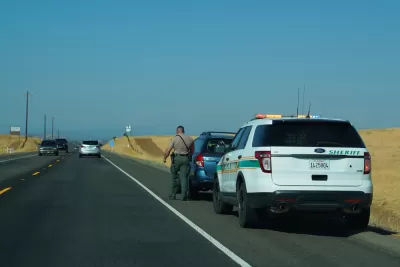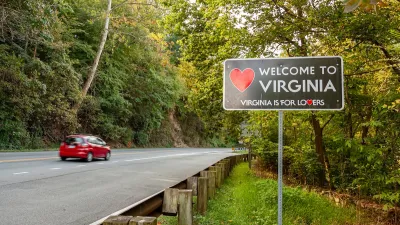A new book makes the case that revenue-oriented traffic policing has far-reaching negative impacts and often fails to improve traffic safety.

In a piece for Streetsblog USA, Kea Wilson describes the thesis of a new book that “argues that America's approach to traffic policing isn't truly designed with safety in mind because it's fueling a dangerous carceral cycle that may actually leave our communities more deadly, car-dependent, and oppressive to us all, especially the most vulnerable.”
The book, Cars and Jails: Freedom Dreams, Debt and Carcerality by Julie Livingston and Andrew Ross, lays out the evidence for their claim. “In some ways, Livingston and Ross argue, extractive fines and extreme police harassment for even the most minor vehicle violations have been an integral part of motordom since its beginning, particularly for the people of color who shoulder an overwhelming majority of both burdens.”
That tendency increased when tax rates were reduced in the 1970s and 1980s, forcing cities to look to new sources of revenue. “Today, much of America's $4 trillion municipal bond load is directly backed by what banks believe will remain a stable stream of money extracted from road users by police and the courts.”
The consequences ripple far beyond fines, impacting road safety. “Because so many Americans live in car-dependent places, a lot of drivers with suspended licenses have no choice but to keep driving anyway — and if they hit someone, they're far more likely to flee the scene and leave their victim to die.” Meanwhile, punitive systems ensnare people in a cycle of fines and jail time, even for violations that didn’t threaten public safety.
FULL STORY: How Some Traffic Fines and Fees Can Make Our Roads More Dangerous

Planetizen Federal Action Tracker
A weekly monitor of how Trump’s orders and actions are impacting planners and planning in America.

Restaurant Patios Were a Pandemic Win — Why Were They so Hard to Keep?
Social distancing requirements and changes in travel patterns prompted cities to pilot new uses for street and sidewalk space. Then it got complicated.

Map: Where Senate Republicans Want to Sell Your Public Lands
For public land advocates, the Senate Republicans’ proposal to sell millions of acres of public land in the West is “the biggest fight of their careers.”

Maui's Vacation Rental Debate Turns Ugly
Verbal attacks, misinformation campaigns and fistfights plague a high-stakes debate to convert thousands of vacation rentals into long-term housing.

San Francisco Suspends Traffic Calming Amidst Record Deaths
Citing “a challenging fiscal landscape,” the city will cease the program on the heels of 42 traffic deaths, including 24 pedestrians.

California Homeless Arrests, Citations Spike After Ruling
An investigation reveals that anti-homeless actions increased up to 500% after Grants Pass v. Johnson — even in cities claiming no policy change.
Urban Design for Planners 1: Software Tools
This six-course series explores essential urban design concepts using open source software and equips planners with the tools they need to participate fully in the urban design process.
Planning for Universal Design
Learn the tools for implementing Universal Design in planning regulations.
Heyer Gruel & Associates PA
JM Goldson LLC
Custer County Colorado
City of Camden Redevelopment Agency
City of Astoria
Transportation Research & Education Center (TREC) at Portland State University
Camden Redevelopment Agency
City of Claremont
Municipality of Princeton (NJ)





























